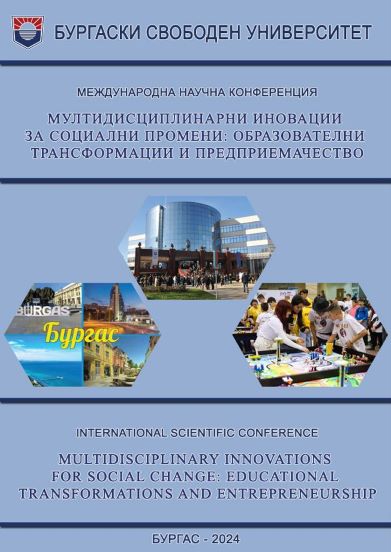
MULTIDISCIPLINARY INNOVATION FOR SOCIAL CHANGE: STEM LEARNING AS A CATALYST FOR TRANSFORMATION IN EDUCATION
МУЛТИДИСЦИПЛИНАРНИ ИНОВАЦИИ ЗА СОЦИАЛНИ ПРОМЕНИ: STEM УЧЕНЕТО КАТО КАТАЛИЗАТОР ЗА ТРАНСФОРМАЦИЯ В ОБРАЗОВАНИЕТО
Keywords: multidisciplinary innovation; education; transformations; entrepreneurship; social change; STEM; learning; teacher roles; pedagogical interactions.
The modern world needs innovations that solve complex problems and lead to positive social change. Education is a key factor in stimulating these innovations, and STEM learning, with its focus on science, technology, engineering and mathematics, is an engine for the transformation of education. Multidisciplinary innovations are the basis of progress in STEM education. They consist in integrating STEM disciplines with other fields, such as art, humanities and social sciences. This approach stimulates creative thinking, problem solving and the construction of new knowledge. Each of the aspects of the STEM philosophy provides an opportunity for multidisciplinarity and the development of key competencies for the 21st century: critical thinking, creativity, problem solving, teamwork, communication, digital literacy; to prepare students for the labor market; to promote social responsibility, because STEM projects can be aimed at solving real problems in society; to overcome educational inequalities.The modern world needs innovations that solve complex problems and lead to positive social changes. Education is a key factor in driving these innovations, and STEM learning, with its focus on science, technology, engineering and mathematics, is an engine for the transformation of education. Multidisciplinary innovation is at the heart of progress in STEM education. These consist of integrating STEM disciplines with other fields, such as the arts, humanities, and social sciences. This approach stimulates creative thinking, problem solving and building new knowledge. Each aspect of the STEM philosophy enables multidisciplinarity and the development of key competencies for the 21st century: critical thinking, creativity, problem solving, teamwork, communication, digital literacy; to prepare students for the labor market; to promote social responsibility, because STEM projects can be aimed at solving real problems in society; to overcome educational inequalities.
More...